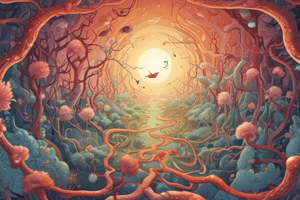Podcast
Questions and Answers
What is the study of the structure and function of biological molecules?
What is the study of the structure and function of biological molecules?
- Molecular Biology (correct)
- Biochemistry
- Cell Biology
- Genetics
What is the organelle responsible for generating energy for the cell?
What is the organelle responsible for generating energy for the cell?
- Nucleus
- Lysosomes
- Mitochondria (correct)
- Ribosomes
What is the process by which cells generate energy from glucose?
What is the process by which cells generate energy from glucose?
- Digestion
- Metabolism
- Respiration (correct)
- Photosynthesis
What is the study of the relationships between organisms and their environment?
What is the study of the relationships between organisms and their environment?
What is the jelly-like substance inside the cell membrane where metabolic processes occur?
What is the jelly-like substance inside the cell membrane where metabolic processes occur?
What is the study of microorganisms, such as bacteria and viruses?
What is the study of microorganisms, such as bacteria and viruses?
What is the site of protein synthesis?
What is the site of protein synthesis?
What is the process by which plants and some other organisms convert light energy into chemical energy?
What is the process by which plants and some other organisms convert light energy into chemical energy?
Flashcards are hidden until you start studying
Study Notes
Branches of Biology
- Botany: study of plants and their interactions with the environment
- Zoology: study of animals and their interactions with the environment
- Microbiology: study of microorganisms, such as bacteria and viruses
- Ecology: study of the relationships between organisms and their environment
- Genetics: study of heredity, genes, and genetic variation
- Biochemistry: study of the chemical processes that occur within living organisms
- Molecular Biology: study of the structure and function of biological molecules
- Cell Biology: study of the structure and function of cells
- Evolutionary Biology: study of the processes that have shaped the diversity of life on Earth
Cell Structure and Function
- Cell membrane: thin layer of lipid and protein molecules that surrounds the cell
- Cytoplasm: jelly-like substance inside the cell membrane, where metabolic processes occur
- Nucleus: control center of the cell, where DNA is stored
- Mitochondria: organelles responsible for generating energy for the cell
- Ribosomes: site of protein synthesis
- Lysosomes: organelles responsible for cellular digestion and recycling
Biological Molecules
- Carbohydrates: energy-rich molecules, such as sugars and starches
- Proteins: complex molecules that perform a wide range of functions, including structural, enzymatic, and hormonal roles
- Lipids: energy-rich molecules, such as fats and oils
- Nucleic acids: molecules that contain the genetic information of an organism, including DNA and RNA
Biological Processes
- Photosynthesis: process by which plants and some other organisms convert light energy into chemical energy
- Respiration: process by which cells generate energy from glucose
- Digestion: process by which organisms break down food into nutrients
- Metabolism: process by which cells convert energy and nutrients into the components of life
- Homeostasis: process by which cells and organisms maintain a stable internal environment despite changes in the external environment
Branches of Biology
- Botany focuses on plants and their environmental interactions.
- Zoology explores animals and their environmental interactions.
- Microbiology delves into microorganisms like bacteria and viruses.
- Ecology examines relationships between organisms and their environment.
- Genetics delves into heredity, genes, and genetic variation.
- Biochemistry analyzes chemical processes within living organisms.
- Molecular Biology studies biological molecules' structure and function.
- Cell Biology explores cell structure and function.
- Evolutionary Biology investigates processes that shaped Earth's life diversity.
Cell Structure and Function
- Cell membrane is a thin layer of lipid and protein molecules surrounding the cell.
- Cytoplasm is the jelly-like substance inside the cell membrane where metabolic processes occur.
- Nucleus is the control center storing DNA.
- Mitochondria generate energy for the cell.
- Ribosomes are the site of protein synthesis.
- Lysosomes handle cellular digestion and recycling.
Biological Molecules
- Carbohydrates are energy-rich molecules like sugars and starches.
- Proteins perform various functions, including structural, enzymatic, and hormonal roles.
- Lipids are energy-rich molecules like fats and oils.
- Nucleic acids contain genetic information, including DNA and RNA.
Biological Processes
- Photosynthesis converts light energy into chemical energy in plants and some organisms.
- Respiration generates energy from glucose in cells.
- Digestion breaks down food into nutrients in organisms.
- Metabolism converts energy and nutrients into life components in cells.
- Homeostasis maintains a stable internal environment despite external changes in cells and organisms.
Studying That Suits You
Use AI to generate personalized quizzes and flashcards to suit your learning preferences.




